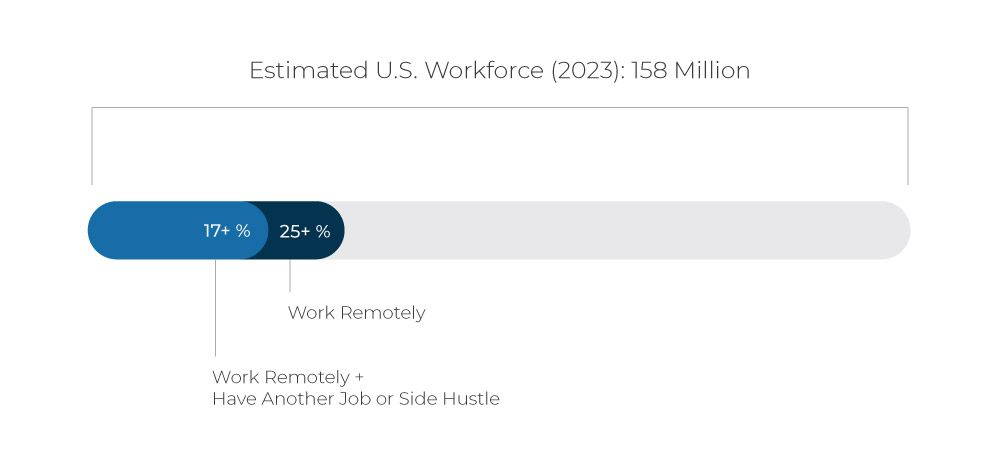“I’m going to plug in from home today.”
“I’m going to head early and knock a few things out at the home office.”
“Do you offer remote working options?”
Many of us have become very familiar with statements and questions like these. As of 2022, over 25 percent of U.S. employees worked remotely (at least part of the time), and 16 percent of U.S. companies are fully remote– a number that will continue to grow. In 2023, workplace flexibility is not just a trend, but an expectation.
But with greater flexibility comes greater responsibility…for the employer.
All employers must invariably ask, “Are my remote workers giving us their all?”
Our Time Is More Divided Than Ever
According to a recent survey, up to 37 percent of remote workers have a second full-time job, and up to 32 percent have a side hustle.
If the results of this survey are applied to the U.S. as a whole, we conclude that two-thirds of the U.S. remote workforce have multiple focuses. While trust is the foundation upon which any employer-employee relationship should exist, it doesn’t mean workers should go unmonitored, and metrics should go untracked.
While most employers may not take issue with an employee’s off-duty activities or pursuits so long as they are appropriate and legal, all employers likely take issue with time theft and double-dipping during the workday. The last thing a company wants is for its employees to be fulfilling for another employer on their dime.
Also, when considering the rising “quiet quitting” trends, we realize there is definitely a need for increased awareness.
Employment Monitoring Can Help
Identifying overemployment in your workforce and having open dialogues with your employees can improve the health and productivity of your organization. But first, you need the insights.
Luckily, employment monitoring solutions are now available to notify HR when an employee works with another company.
Consent for such monitoring can be given as part of the pre-hire background check and will continue until the employee is no longer with the organization. Monitoring insights are pulled from a database of 146 million (and growing) active employment records from over 2.5+ million employer contributors. These records are regularly updated and can be leveraged to help employers improve culture, reduce risk, discourage time theft, and increase retention.
With employment monitoring, employers can:
- Schedule reports at preferred intervals
- Review reports and identify overemployed workers
- Utilize insights to maintain a healthier workforce
Can Adverse Action Be Taken?
Now, for a critical question…
Can an employer take action on an employee based on their outside employment opportunities?
First, it’s important to mention that employment monitoring insights aren’t intended to be used with a heavy hand. Instead, they are meant to discourage time theft and allow employers to keep a pulse on factors that may be limiting productivity. In other words, employment monitoring is a valuable tool that helps organizations get more out of their remote workforce through information that opens the door to meaningful communication.
But to address the question head-on, sometimes it is unlawful to terminate an employee because of their job status elsewhere, and sometimes it’s not.
Employment is considered “at-will” in most states, meaning employers can terminate employment relationships at any time and for any reason as long as it is not illegal or discriminatory.
However, if employment agreements are not “at-will” or the employee’s second job is protected by federal or state law (such as serving in a military capacity), then it would not be lawful to terminate on those grounds.
Furthermore, some states have laws that aim to protect employees’ off-duty conduct. Therefore, if a second job is legal and does not interfere with their other job duties, it would likewise be unlawful to terminate due to the second job in those states.
Takeaways
Regardless of state law, employment monitoring can benefit company culture and boost productivity. In a world where remote working is becoming increasingly common, such a tool can be incredibly valuable.
Contact us to learn more about employment monitoring.



